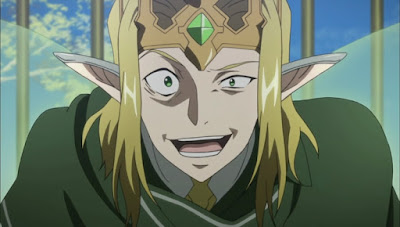Continuing my bad habit of impulse-purchasing anime, a few months
ago I bought myself a copy of Super Dimension Century Orguss.
Never heard of it? Yeah, me neither. But the cover art just
screamed Macross at me, and sure enough, the two shows shared
character designer Haruhiko Mikimoto. Even better, they shared
Noboru Ishiguro as director, one of the more renowned figures in
sci-fi anime who also did the first Megazone 23 OVA and Legend
of the Galactic Heroes. Those are some solid credits right
there, but what about this more obscure show?
From episode one there's a solid mashup of science fiction ideas.
In the future, two major world powers are at war, and asshole pilot
Kei becomes a key part of one's mission to bomb the enemy's orbital
elevator. Not with just any bomb, mind you, but with a deadly
Dimensional weapon that, due to a few miscalculations on everyone's
part, ends up warping space and time. Kei gets flung twenty years
into the future to an Earth comprised of multiple timelines; humans
evolved different ways on different timelines, other creatures
dominated the planet on others, and machines on still others. Now
all possibilities are stuck with each other, and Kei must navigate
the warring factions long enough to save the Earth from a slow death
via increasing dimensional instability.
So it's basically a free-for-all where anything is plausible, but
the plot turns out more grounded than you might expect. That's
because the focus is only two or three races and the interactions
between their members. In this sense it again recalls Macross,
where humans, Zentradi, and Meltlandi found common ground and learned
to coexist only after many confrontations. The ragtag crew
eventually assembled aboard the Glomar and their conflicts
demonstrate on a small scale how people (and robots, and dinosaur . .
. psychic . . . things) can more or less live together despite their
different viewpoints or backgrounds. Our love for one another makes
it possible.
Sounds trite and cheesy? It is, as befits a space opera from the
early 80s, but the cast gets treated with enough dignity to sell the
idea. Almost everybody wants something beyond just survival,
and goes through at least a few introspective scenes wherein they
question what they want and what they're doing. Mimsy may be
mistaken at first glance as the doe-eyed, stereotypical love interest
who eventually realizes she can't live without the hero. But that
would be overlooking her long-running goal of using Kei as a tool to
help her race, her conflict between duty and friendship as she
discovers said race's intentions, and her reservations against
entering a relationship that may be fated to end quickly. Kei, for
his part, puzzles out the meaning of responsibility without
completely losing the free-spiritedness that made him endearing.
Shaya is a mess of contradictions and insecurities under her warm,
matronly personality, and even mascot or comic relief characters have
their own personal conflicts and tragedies. There's plenty of cheesy
interactions to be found, which maybe I unfairly write off because I
have a thick skin for the stuff, but also lots of emotional meat to
enjoy if you aren't totally allergic to melodrama.
Likewise, the video quality itself will either be a bonus or a
turn-off depending on the viewer. Orguss is an early 80s TV
show. It looks like an early 80s TV show. Quality ranges from
decent to janky, with stock footage rearing its head during many a
battle scene. The trade-off is that vehicles, missiles, and
explosions have a hand-drawn charm that no CGI can replicate, but
it's understandable if many get annoyed seeing the same three
missiles blow up the same three Nikicks over and over. On a similar
note, while the Haruhiko Mikimoto character designs have a beautiful
retro look in key art, when budgets wear thin you'll notice eyes
wandering all over faces, to say nothing of weird limb movements.
The music remains consistently good, at least, never dropping below
serviceable, and the opening theme is an earworm.
I can see why people would turn their noses up at this title. It
looks hopelessly dated, it's got cheese coming out the ears, and the
ending is the very definition of “your mileage may vary”. But
Super Dimension Century Orguss is also a show with a lot of
heart, one that has fun with science fiction concepts, develops its
characters well, and knows how to leave you on a good cliffhanger.
Praise be once again to Discotek for letting us own this lesser-known
title; no other anime licensor is as dedicated to bringing back
neglected chunks of history. Until a decent amount of Macross
gets its own release (fingers crossed), Orguss is a worthy
successor to the message that emotions conquer all.























